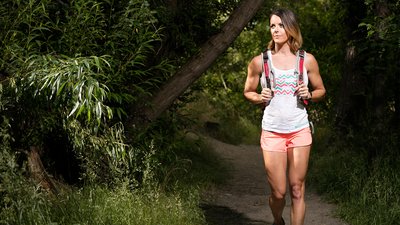With summer underway, the days may be longer, but that doesn't mean you'll have any more time to squeeze in a workout if your social engagements have likewise expanded. Beach outings, summer picnics, outdoor sporting activities, and music festivals can all chip away at your free time.
You won't miss a beat with your summer workouts if you plan correctly. Staying fit when you're seemingly always on the go is an added challenge, but two ultra-fit Dymatize athletes, Brandan Fokken and Brooke Erickson, share their ideas that have worked best for them.
1. Bring Exercise To Your Job
If your job requirements extend past a normal working day, consider bringing those workouts to the office. "Bring along some exercise bands or light dumbbells. They're easy to pack and cheap to buy," says physique competitor Brandan Fokken, who is also a corporate wellness manager. "You can do push-ups, crunches, squats, jump squats, mountain climbers, burpees, lunges, and other simple moves with just a minimal amount of space."

If getting a full session in during your lunch break is difficult, break your workout into pieces to stay energized during that afternoon lull. You can even add in 10-minute walks during your break to increase the calorie burn and boost your mood.
2. Don't Eat Mindlessly
The work environment can be filled with nutritional landmines; National Doughnut Day seems to fall every Friday. You need to be especially careful when snacking on foods while your mind is engaged in different activities. You can easily stuff a meal's worth of calories in before you know it.

"Don't blow your caloric intake just because sugar-coated foods are freely available," says Erickson. "That's especially difficult when you're on the road a lot, making it harder to watch what you're eating or know the number of calories you're consuming."
Bringing along protein bars that fit your macros is a better choice than eating two glazed doughnuts. What's more, drinking water (including flavored water) before a meal can increase feelings of fullness so you're less inclined to choose the super-sized meal.
3. Make Smart Choices When Dining Out
Eating out can quickly throw off your diet—but it doesn't have to. "Be sure to ask for items cooked the way you want them," says Fokken. He recommends looking at the menu online ahead of time to get a better idea of what you'd like; you may even see macro and calorie totals online that you can't find on the paper menu. Share dishes with a friend to help lessen the calorie load. Choose meat items that are steamed, broiled, baked, grilled, poached, or roasted.

Start with a healthy salad, and skip the rolls or chips, which can be an especially damaging start at Mexican or Italian restaurants. "It's also important that you choose vegetables that have been steamed or grilled," Fokken adds. "Always ask for condiments such as dressing, sour cream, cheese, ketchup, and mayonnaise on the side." That way, you control how much you're eating.
A good initial effort in a restaurant can be blown up with a 750-calorie dessert. Opt for a cup of fresh fruit instead.
4. Log Your Steps
When trying to get fit on the go, all the little things you do add up. "Walk when you can, moving as much as possible and trying your best to hit 10,000 steps each day," suggests Erickson. "The average person with a desk job walks fewer than 3,000 steps daily, but if you make an effort to be more active, you'll likely burn more calories when you're getting around than you would at home."

Consider investing in a counter to measure how many steps you're taking. Get off to a good start in the morning; the rest of the day will seems easier.
5. Keep Yourself Hydrated
Just because you're busy doesn't mean you can neglect hydration. This includes all the fluids you drink each day, including coffee. "Dehydration can lead to headaches, muscle cramps, fatigue, reduced concentration, and even a drop in performance," says Fokken. "Bodily processes work less efficiently when you're dehydrated. Dehydration can even lead to food cravings and binge eating."
Since loss of fluids rises rapidly when you're outdoors in hot and humid environments, drink fluids regularly—not just when you're thirsty. You may even want to avoid training outdoors in the midday heat, to reduce your risk of heat illnesses.
Fokken's rule for fluid intake: "Drink half your body weight [in pounds] in ounces per day, and even more if you're active and sweating outdoors, especially under the summer sun."
6. Increase Your Workout Density
Let's already assume your schedule is so tight that there's no longer room for your 90-minute cardio-and-weight workout, and being cooped up indoors is a bad idea to start with. A better idea is to limit your training session to about an hour. This means getting in and moving fast. One way to do that is to do additional work between your weight-training sets.
For example, do bodyweight squats between sets of bench presses, increasing the amount of work you do in the same amount of time, or increasing your density. Or do push-ups between your sets of squats. This technique works especially well for fat loss, and could include other activities like jumping rope, mountain climbers, or other calisthenics-type exercises.
7. Prepare Ahead Of Time
Sticking with your diet is half motivation and half planning. "Prep and pack your food the day before, or consider having a prep day each week devoted to cooking your meals," suggests Fokken. That way, you can control not just portion sizes but also the macros of each meal. Plus, you can season the foods to your own taste.

By being prepared you are for your day ahead, you'll be less likely to let your busy schedule force you into long periods without eating, and you'll be less tempted to grab fast, unhealthy food choices.
Including the right supplements can also fill in some daily gaps. Having whey protein and a shaker cup available with you can boost anabolism quickly. A handful of protein bars (keep them in a cooler so they won't melt) and fresh fruit can make an easy and healthy meal in a pinch.
If you find yourself fatigued from being on the road all day, a pre-workout supplement with caffeine and/or green tea extract will help with the late-afternoon slump and boost your energy before a workout.


